The Monstera plant has become pretty popular due to its exotic looks and low maintenance appeal.
However, not everyone is aware of the benefits of Monsteras or if they make a good indoor plant for their home and office. Let’s find out!
10 Benefits of Monstera Plants
While plants have long been proven to have many benefits, the Monstera plant has several uses and benefits that make it a good indoor plant.
Here are some proven benefits of growing a Monstera plant:
1) Nutrient-Rich Fruit
Monstera Deliciosa is also cultivated for its edible fruit, in the shape of corn on the cob, which tastes like a combination of banana and pineapple. The fruits are considered a delicacy in local markets due to their rarity.
The fruit is nutrient-rich and contains significant vitamin C and potassium.
However, this fruit is only edible when fully ripened. If you eat it before it’s ripe enough, it will cause severe gastrointestinal upset and irritation of the mouth and stomach due to calcium oxalate crystals.
While these plants will flower and produce fruit in a greenhouse or in their tropical habitat, they are unlikely to flower and produce fruit as a houseplant.
Also, it may take longer than a year for fruits to mature. When ripening, the previously green hexagonal scales will turn yellow, similar to how a banana will ripen (source). As the fruit ripens, these scales fall off the fruit, releasing a strong sweet scent.
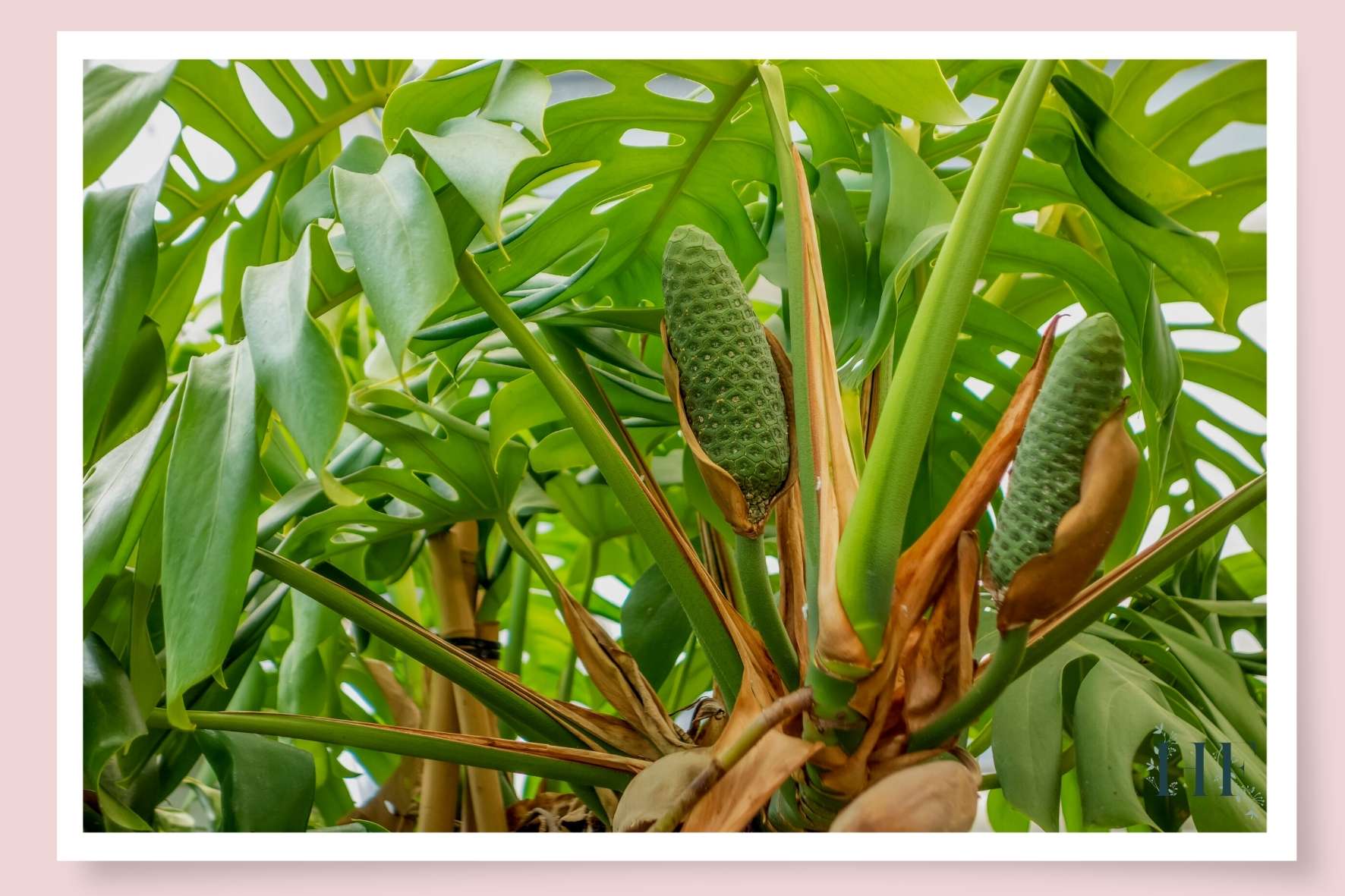
2) Air Purifying
Apart from carbon dioxide, some houseplants can also remove other pollutants such as benzene, formaldehyde, trichloroethylene, xylene, toluene and ammonia.
According to the findings of the 1989 NASA clean air study, the large, broad leaves of the Monstera Deliciosa do suggest that it would be able to remove toxins and chemicals from the air around us.
However, in order to let a Monstera truly purify the air, it would need to be in a sealed room without an HVAC system (i.e. heating, ventilation, and air conditioning), which is an unrealistic scenario for most of us.
Also, for air purifying results, another significant influencer is the number of plants in the space.
“For purification, you would need at least two large plants per one hundred square feet.”
Wolverton, B. C. (1996), How to Grow Fresh Air. New York: Penguin Books.
So, while there are health benefits to consider from bringing nature indoors, it is doubtful that Monsteras make a substantial difference in the air quality around them (unless certain conditions apply, as mentioned above).
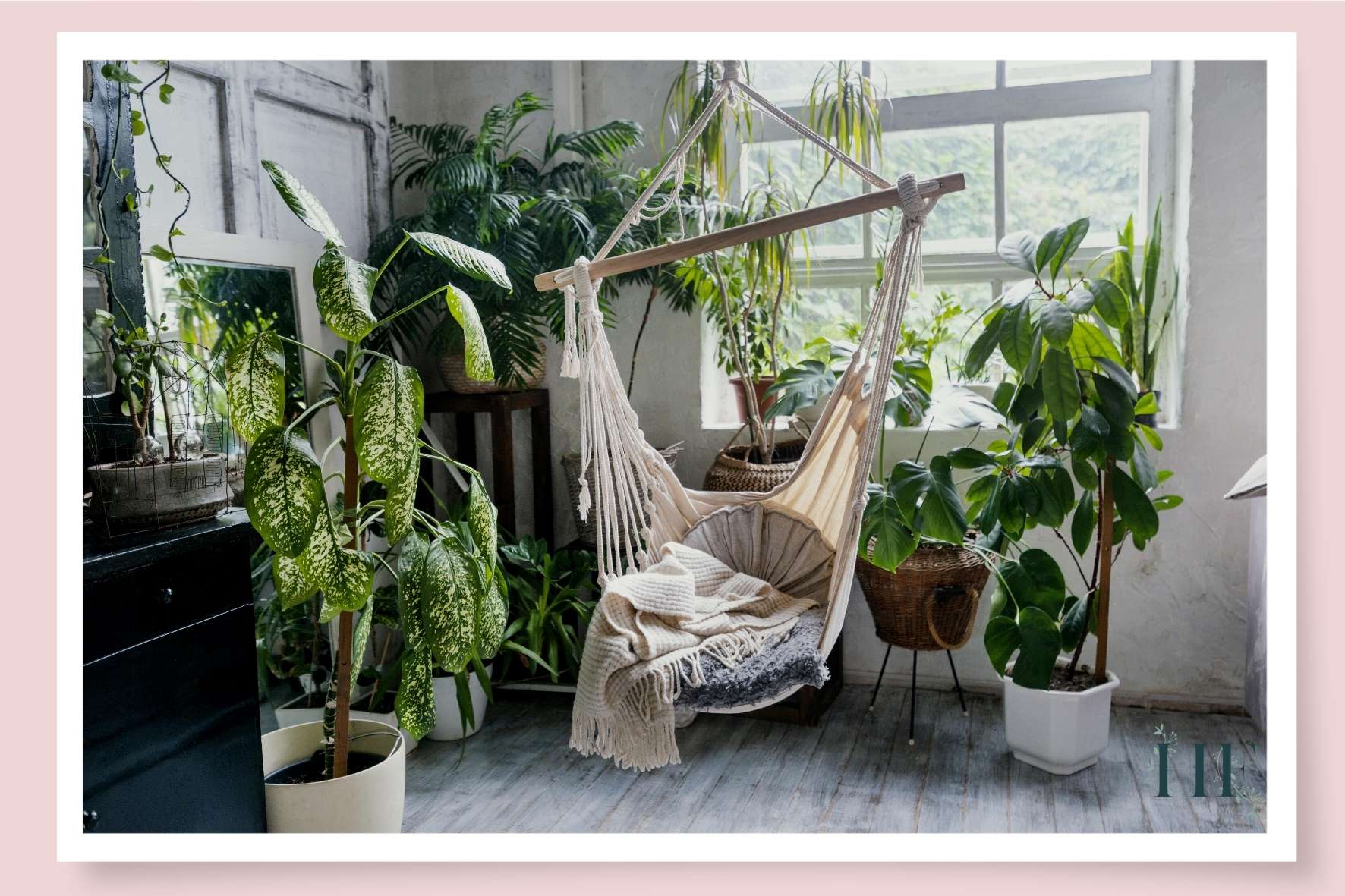
3) Symbolism of Happiness in Feng Shui
According to Feng Shui, an ancient Chinese practice harmonizing humans with their surroundings, Monstera brings happiness and stimulates big dreams.
The philosophy of feng shui aims to arrange cities, buildings, tombs, architecture, design, plants, furniture, and pieces of any space to create balance with the natural environment’s energy flow, in order to harness this energy and establish harmony between the natural world and the people who inhabit it.
In feng shui, the Bagua creates a map of an energy grid that contains eight of the trigrams or elements. So, you can place your Monstera in the appropriate section of your home’s Bagua map to draw its type of energy and expansion into various corners of your life.
In Chinese traditions, the Monstera plant symbolises long life and honouring elders and respected individuals, which makes them an excellent gift for anyone older whom you greatly admire and respect.
In Hawaii, Monsteras has been loved because it is regarded as a “ray of hope” and it has become a popular motif too.
However, in the Western culture, in the Victorian language of flowers, Monstera flowers represent deep relationships, glad tidings, and big plans.
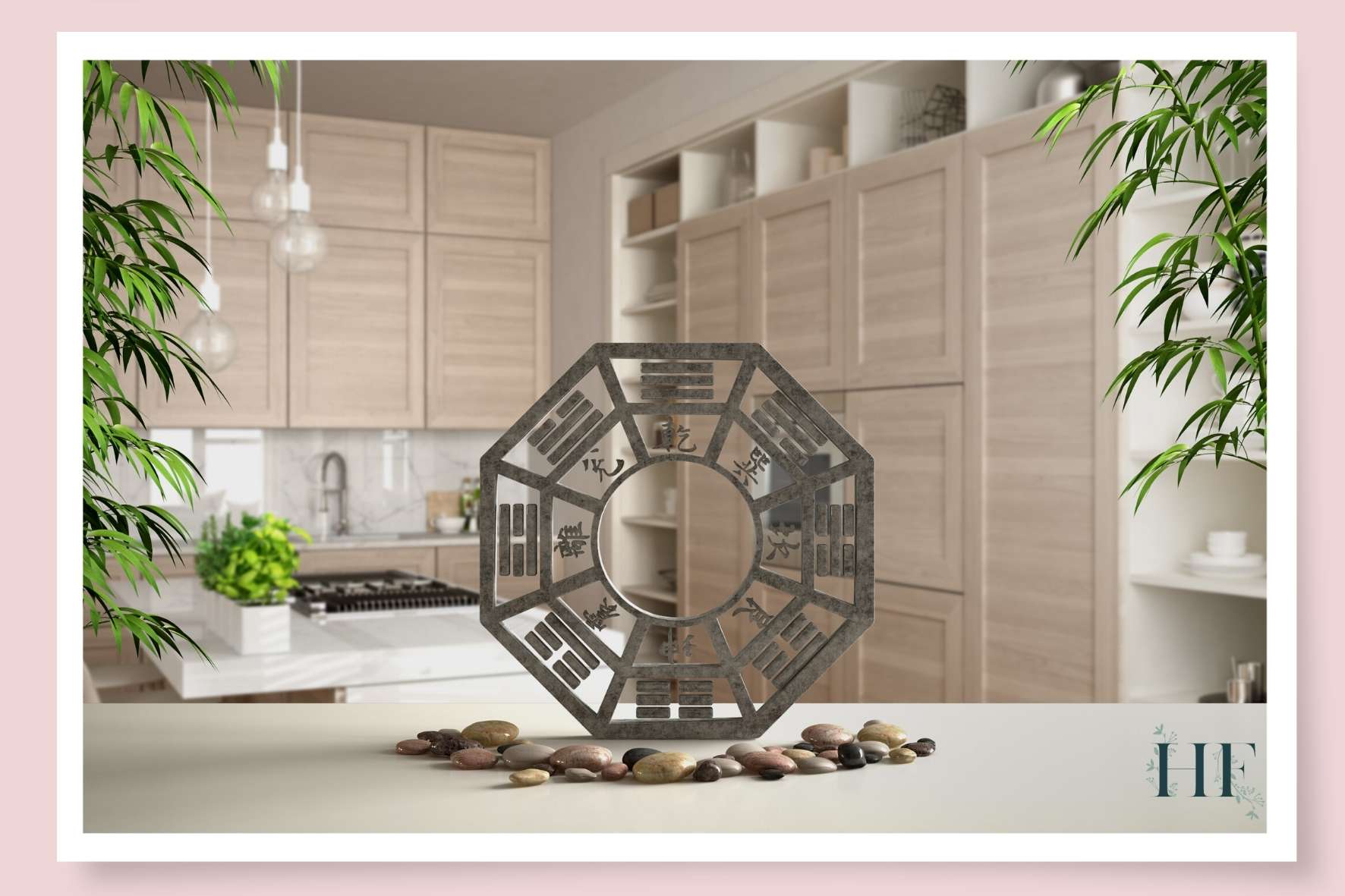
4) Aesthetic Appeal
Despite their various uses and benefits, monstera plants are probably most prized for their ornamental beauty.
Since 1840, the Monstera Deliciosa plant in particular was propagated and distributed to other botanic gardens in Europe and European colonies in the tropics (source).
Nowadays, in the U.K., Monstera Deliciosa and the cultivar, ‘Variegata,’ have gained the Royal Horticultural Society’s Award of Garden Merit.
Apart from its popularity as a visually interesting houseplant thanks to its fenestrated leaves, the Monstera plant is also a popular subject replicated in art, ornaments, textiles, and wallpaper used in fashion and interior design.
It even has its own hashtag on Social Media: #monsteramonday

5) Medicinal Properties
Monstera plants have different medicinal properties for different cultures.
In Central America, the fruits are consumed as a natural laxative, and the roots are incorporated into infusions to reduce arthritic pain.
Portions of the Monstera plant are also used in China to relieve symptoms associated with fevers, coughs, and infections.
In Martinique, the root is used to make a remedy for snakebite.
However, it’s not advisable to replicate any of these treatments on your own since all parts of Monstera are toxic, as they contain insoluble calcium oxalate crystals.
Read also: 14 Surprising Monstera Deliciosa Facts [With Images] – for other uses and interesting facts!
6) Stress Reduction Capacity
Having live plants at home or in the office can help lower stress levels, both on a psychological and physiological level (source).
Moreover, they encourage even heart rate and blood pressure to improve your physical and mental state.
Also, plants like Monstera boost the optimum oxygen level in the air to reduce stress-causing hormones.
Like most houseplants, they create oxygen during the day by breaking down carbon dioxide, while they are undergoing photosynthesis during the daylight hours.

7) Sharpened Attention and Productivity
Living around plants also elevates your senses and sharpens your attention, which improves your ability to concentrate or focus, and therefore be more productive at work or your studies (source).
This is why keeping plants on your desk at work or at home is beneficial.
Psychologists have found that, as well as oxygenating the air, bringing some flora into the workplace can improve employee satisfaction and can increase productivity by up to 15%.

8) Therapeutic
Another health benefit is practising horticultural therapy, i.e., cultivating plants for therapeutic benefits.
According to various studies, growing a plant has been shown to significantly reduce anxiety, depression, and even dementia symptoms in patients.
Also, this NCBI study shows that taking care of a plant, including watering and transplanting, reduces stress and mental fatigue. This means that you don’t need to have a particular condition to benefit from growing a plant.
So, growing and caring for a Monstera could help improve your quality of life, too. I definitely feel a mood boost every time I tend to my plants and feel calmer afterwards.
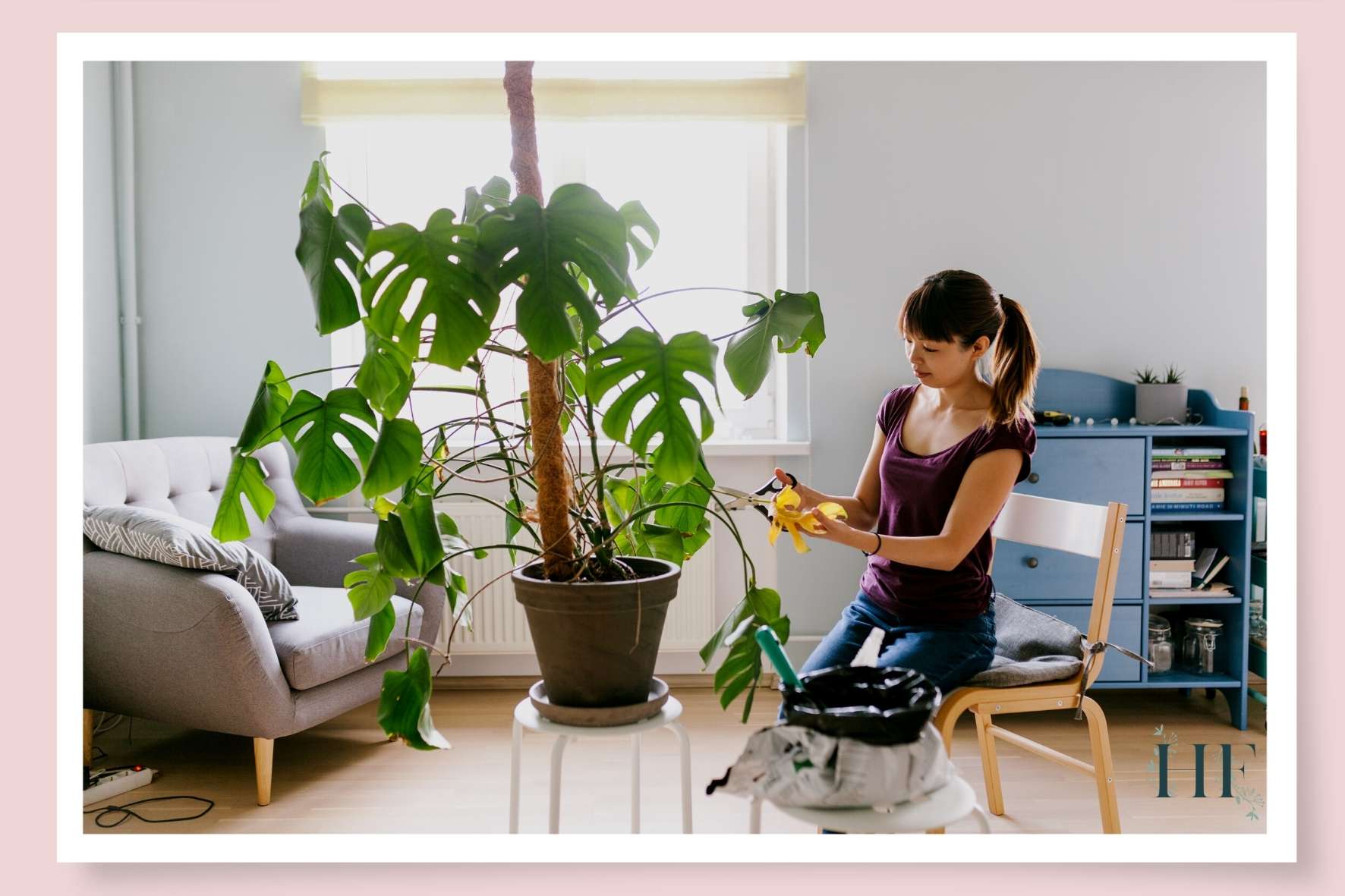
9) Improved Sleep and Sound Absorption
As monstera plants remove toxins from the air and produce oxygen, they can also help you sleep better if you place them in your bedroom. People fall asleep more quickly and enjoy higher quality sleep when slumbering in clean air.
Plus, they naturally calm your nerves as explained before, allowing you to breathe calmly.
Finally, Monsteras, like other plants with broad leaves, make excellent sound barriers because their surfaces can absorb sound vibrations, reducing noise (source), which improves your sleep quality.

10) Dehumidifying and Odour Removal
Monsteras are hemiepiphyte since their roots go both downwards into the soil and upwards climbing over trees. These plants live as epiphytes during a part of their life, which allows them to absorb nutrients from the air and water through their leaves.
Being an epiphytic plant allows Monsteras to absorb humidity from the surrounding air. As a result, they are an excellent choice to regulate the humidity levels of your home (more precisely, the humidity levels in the particular room they are displayed, doors closed).
Additionally, Monsteras can absorb odour-causing toxins from the air and prevent mould or mildew growth to boost fragrance around the house.
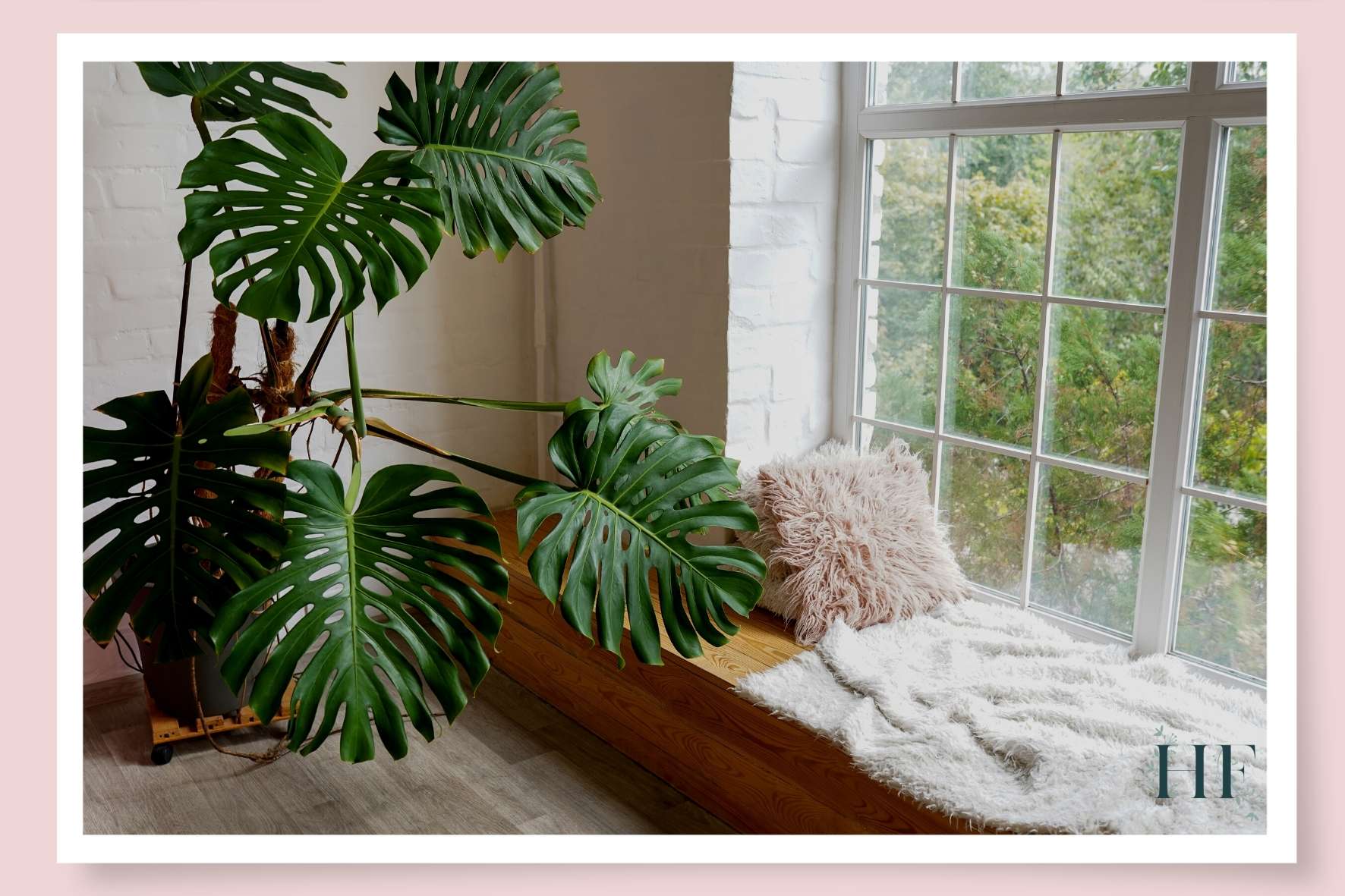
Related Questions
Is Monstera Plant Good For The Home?
Due to their low maintenance, ornamental qualities and many benefits, Monstera can be a good indoor plant to keep at home or/and in the office. Also, they thrive in most indoor environments since they tolerate low light (but they will grow faster and bigger on a spot with bright indirect sunlight).
This statement houseplant can be grown big or small making them the perfect indoor plants for both tiny apartments and large open-plan homes.
Insider Tip: Remember to spin the monstera plant ever so often so the leaves grow evenly.
Is Monstera Good for Health?
The Monstera plant has many health benefits, including improving the levels of oxygen, reducing stress, purifying the air, lessening noise and odours, sharpening your attention and ability to focus, increasing productivity, and improving your sleep quality.
Also, it’s considered a medicinal plant in some places like Central America, China, and Martinique, as a remedy for arthritis and snake bites, for example.
Finally, the fruit of Monstera Deliciosa is edible when fully ripe and it’s rich in vitamin C and potassium.
Are Monstera Plants Used in Feng Shui?
Although Monstera is native to tropical America, it is also popular in South East Asia.
When it comes to Feng Shui, which originated in China, Monstera brings happiness and stimulates big dreams.
Monstera plants are popularly used in feng shui to draw positive energy into various corners of the home’s Bagua map.
Insider Tip: When incorporating a Monstera plant into a feng shui design, be mindful of the plant’s capacity to grow into a large size. Placing it in a location where the plant will feel out of proportion can actually attract too much energy or cause energy blocks inside your home’s Bagua map.
Is Monstera a Lucky Plant?
The Monstera plant can be considered a lucky plant since it brings happiness and stimulates big dreams according to the Fen Shui practice. Also, in the Chinese tradition, the Monstera plant symbolises long life and honouring elders and respected individuals.
In Hawaii, Monsteras has been loved because it is regarded as a “ray of hope” and it has become a popular motif too.
You can decide to place a Monstera in the money, professional, family, or relationship corner of your home’s or office’s Bagua map to attract positive energy to these areas of your life.
Are Monstera Plants Poisonous to Humans and Pets?
Although the fully ripe fruit of Monstera Deliciosa is edible, the rest of this plant and the other 45 Monstera types are toxic to humans and pets.
All the parts of the plant, including the unripe fruit in the case of Monstera Deliciosa, contain calcium oxalate crystals, which is why they are toxic if ingested and cause irritation to the touch.
In terms of plant toxicity levels, Monstera Deliciosa is labelled as 3 or 4 out of 4 (source). Their needle-shaped crystals can irritate the skin, mouth, tongue, and throat, resulting in throat swelling, breathing difficulties, burning pain, and stomach upset.
Read also: Is Monstera Toxic to Cats, Dogs and Babies? – for some ideas on keeping pets away from your Monstera and childproofing your plants.

